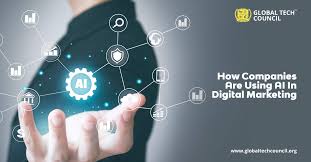The Role of AI in Transforming Marketing Strategies
Artificial Intelligence (AI) is revolutionizing the marketing landscape, offering businesses unprecedented opportunities to enhance their strategies and engage with consumers more effectively. As AI technology continues to evolve, its integration into marketing practices is becoming increasingly sophisticated, enabling companies to personalize experiences, optimize campaigns, and gain valuable insights.
Personalization at Scale
One of the most significant impacts of AI in marketing is its ability to deliver personalized experiences at scale. By analyzing vast amounts of data from various sources, AI algorithms can identify patterns and preferences unique to each consumer. This allows marketers to tailor content, product recommendations, and messaging that resonate with individual customers.
For example, AI-driven recommendation engines on e-commerce platforms suggest products based on a user’s browsing history and purchase behavior. This level of personalization not only enhances the customer experience but also increases conversion rates by presenting relevant options that align with the consumer’s interests.
Optimizing Marketing Campaigns
AI tools are transforming how marketers design and execute campaigns. Machine learning algorithms can analyze past campaign data to predict future performance and optimize resource allocation. This means marketers can make data-driven decisions about where to invest their budget for maximum impact.
Furthermore, AI-powered platforms can automate A/B testing processes by quickly identifying which variations of a campaign perform best. This enables marketers to refine their strategies in real-time, ensuring they achieve optimal results with minimal manual intervention.
Enhancing Customer Insights
The ability of AI to process large datasets quickly allows businesses to gain deeper insights into customer behavior and market trends. By leveraging natural language processing (NLP) and sentiment analysis, companies can monitor social media conversations and online reviews to understand public perception of their brand.
This wealth of information helps marketers identify emerging trends, assess brand sentiment, and adjust strategies accordingly. With these insights, businesses can stay ahead of competitors by proactively addressing customer needs and concerns.
Challenges and Considerations
While the benefits of AI in marketing are substantial, there are challenges that businesses must address when implementing these technologies. Privacy concerns are paramount as consumers become more aware of how their data is used. Companies must ensure they adhere to data protection regulations while maintaining transparency with their audience.
Additionally, integrating AI into existing systems requires significant investment in both technology and talent. Organizations must be prepared to train staff or hire experts who can manage complex AI tools effectively.
The Future of AI in Marketing
The potential for AI in marketing is vast as technology continues to advance rapidly. Future developments may include even more sophisticated personalization techniques powered by deep learning models or enhanced virtual assistants capable of engaging customers through natural conversations.
As businesses continue adopting these innovations strategically while addressing ethical considerations surrounding data privacy—AI will undoubtedly play an integral role shaping successful marketing strategies across industries worldwide.
9 Essential AI Strategies to Revolutionize Your Marketing Approach
- Utilize AI to analyze customer data for personalized marketing campaigns.
- Implement chatbots powered by AI to provide immediate customer support.
- Use AI algorithms to optimize ad targeting and maximize ROI.
- Employ machine learning for predictive analytics to forecast customer behavior.
- Incorporate natural language processing (NLP) for sentiment analysis of customer feedback.
- Utilize AI-powered tools for content creation and curation to engage your audience.
- Implement recommendation systems based on AI algorithms to increase cross-selling opportunities.
- Leverage AI for dynamic pricing strategies based on market demand and competitor pricing.
- Stay updated with the latest trends and advancements in AI technology for marketing.
Utilize AI to analyze customer data for personalized marketing campaigns.
Leveraging AI to analyze customer data is a game-changer for creating personalized marketing campaigns. By utilizing advanced algorithms, businesses can sift through vast amounts of data to uncover patterns and insights that might otherwise go unnoticed. This enables marketers to segment their audience more effectively and tailor their messaging to meet the specific needs and preferences of individual customers. Personalized campaigns not only enhance customer engagement by making interactions more relevant but also drive higher conversion rates. As a result, businesses can build stronger relationships with their customers, fostering loyalty and increasing lifetime value.
Implement chatbots powered by AI to provide immediate customer support.
Implementing AI-powered chatbots for customer support is a game-changer in the marketing landscape. These intelligent virtual assistants can handle a wide range of customer inquiries instantly, providing 24/7 support and significantly enhancing the customer experience. By utilizing natural language processing, chatbots can understand and respond to queries in a human-like manner, resolving issues quickly and efficiently. This not only reduces wait times for customers but also frees up human agents to focus on more complex tasks. Additionally, chatbots can collect valuable data on customer interactions, helping businesses refine their marketing strategies and improve service offerings. Overall, AI-driven chatbots are an essential tool for companies looking to boost customer satisfaction and streamline support operations.
Use AI algorithms to optimize ad targeting and maximize ROI.
Leveraging AI algorithms to optimize ad targeting is a game-changer for businesses aiming to maximize their return on investment (ROI). By analyzing vast amounts of data, AI can identify patterns and trends that may not be immediately apparent to human marketers. This enables businesses to target their advertisements more precisely, reaching the right audience at the right time with the right message. As a result, companies can reduce wasted ad spend on uninterested audiences and increase engagement rates. Additionally, AI-driven insights allow for continuous improvement of ad strategies by quickly testing variations and determining which approaches yield the best results. Ultimately, using AI for ad targeting enhances efficiency and effectiveness in marketing campaigns, leading to improved ROI.
Employ machine learning for predictive analytics to forecast customer behavior.
Employing machine learning for predictive analytics in marketing allows businesses to forecast customer behavior with greater accuracy and insight. By analyzing historical data and identifying patterns, machine learning algorithms can predict future trends and preferences, enabling marketers to anticipate customer needs and tailor their strategies accordingly. This proactive approach not only enhances the effectiveness of marketing campaigns but also fosters stronger customer relationships by delivering personalized experiences that resonate with individual preferences.
Incorporate natural language processing (NLP) for sentiment analysis of customer feedback.
By incorporating natural language processing (NLP) for sentiment analysis of customer feedback, businesses can gain valuable insights into customer perceptions and emotions. NLP algorithms can analyze text data from various sources, such as reviews, social media comments, and surveys, to understand the sentiment behind each message. This allows marketers to identify trends, gauge customer satisfaction levels, and pinpoint areas for improvement in products or services. Leveraging NLP for sentiment analysis enables companies to respond promptly to customer feedback, enhance brand reputation, and tailor marketing strategies to better meet consumer needs and expectations.
Utilize AI-powered tools for content creation and curation to engage your audience.
Utilizing AI-powered tools for content creation and curation is an effective strategy to engage your audience in today’s digital landscape. These tools can generate high-quality content by analyzing data trends, consumer preferences, and relevant topics, ensuring that the material resonates with your target audience. By automating the curation process, AI can sift through vast amounts of information to select and suggest the most pertinent articles, videos, or social media posts that align with your brand’s voice and objectives. This not only saves time but also ensures a consistent flow of engaging content that keeps your audience informed and interested. As a result, businesses can maintain a dynamic online presence while focusing on strategic initiatives to drive growth.
Implement recommendation systems based on AI algorithms to increase cross-selling opportunities.
Implementing recommendation systems powered by AI algorithms can significantly enhance cross-selling opportunities for businesses. These systems analyze customer data, such as browsing history, purchase patterns, and preferences, to suggest complementary products or services that customers might find appealing. By leveraging machine learning techniques, these recommendations become increasingly accurate over time, leading to higher conversion rates and customer satisfaction. For instance, an online retailer can use AI-driven recommendations to suggest accessories or related items that pair well with a customer’s recent purchase. This not only boosts sales but also enhances the shopping experience by providing personalized and relevant options that meet the individual needs of each consumer.
Leverage AI for dynamic pricing strategies based on market demand and competitor pricing.
Leveraging AI for dynamic pricing strategies enables businesses to optimize their pricing models by analyzing real-time market demand and competitor pricing. AI algorithms can process vast amounts of data to identify trends and fluctuations in consumer behavior, allowing companies to adjust prices dynamically to maximize revenue. This approach ensures that prices remain competitive while also reflecting the current market landscape. By using AI-driven insights, businesses can respond quickly to changes in demand, such as increasing prices during peak times or offering discounts when demand is low. This not only enhances profitability but also improves customer satisfaction by offering fair and timely pricing tailored to market conditions.
Stay updated with the latest trends and advancements in AI technology for marketing.
Staying updated with the latest trends and advancements in AI technology is crucial for marketers aiming to maintain a competitive edge. As AI continues to evolve, it regularly introduces new tools and strategies that can significantly enhance marketing efforts. By keeping abreast of these developments, marketers can leverage cutting-edge technologies to improve customer engagement, optimize campaigns, and personalize experiences more effectively. This proactive approach not only helps in identifying opportunities for innovation but also ensures that marketing strategies remain relevant and impactful in an ever-changing digital landscape. Regularly engaging with industry publications, attending webinars, and participating in professional networks are effective ways to stay informed about the latest AI trends in marketing.


